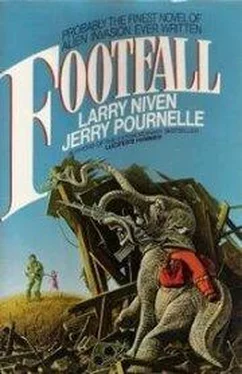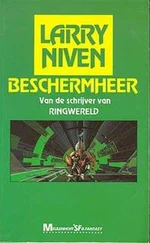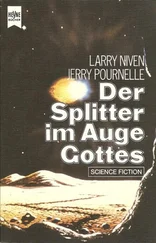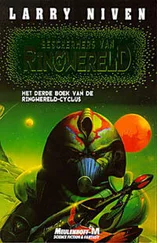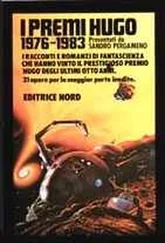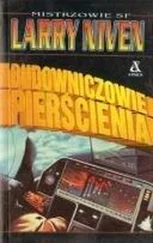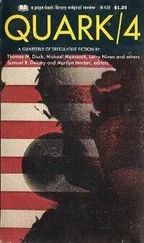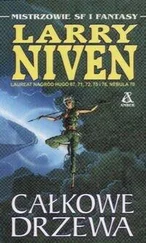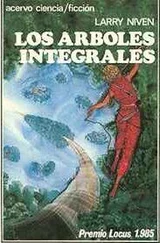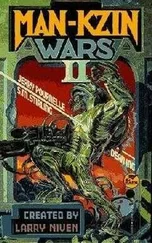Another screen showed all the effective missiles remaining under U.S. control. Lights blinked and colored lines flowed across the screens as the main battle computer matched missiles with Invader targets.
General Toland came in. “All ready at my end,” he said.
Not that the Army has much to do — unless the snouts start dropping rocks at random!
“Good.” Carrell stood at the balcony window, his eyes fastened on the screens below. After a moment, General Toland sat at one of the desks.
One screen faded, then was replaced by a map of the South Atlantic. A bright red line rose from the ocean and arced toward Johannesburg.
“God, what if it really hits?” Toland said to no one.
“It won’t,” Carrell said.
Other lines arced upward from the South Atlantic. One rose straight up: the EMP bomb. Then a bright blue ring sprang up to surround that area.
“We’ve lost communications with Ethan Allen,” Jenny reported. “The Nathaniel Greene is launching now.” The EMP bomb bloomed into a red patch, wide of Earth’s arc. More lines sprang up, this time from farther south, almost directly below the Cape of Good Hope. After a few moments a blue circle appeared there, too.
“No communications with Nathaniel Greene,” Jenny said. “Or anywhere else for the next few hours. We got our electromagnetic pulse.” The room seethed with static.
The office door opened. Jack Clybourne ushered the President in. General bland stood. Jenny saw him, but remained seated.
“Good afternoon,” President Coffey said. “Continue with your duties.” He sat at the large desk in the middle of the room.
“Actually, we have very little to do,” Admiral Carrell said. “The tough work was planning this. Now it either works or it doesn’t.”
Reassuring bullshit, Jenny thought. No battle plan ever works.
Seventeen digit ships destroyed in the war. We can’t find three. Assume one destroyed, unreported, and two on the ground in Africa, where they can’t rise in time. Can we get that lucky? Another of the battle screens flashed to show Georgia and South Carolina. A network of red lines leaped upward toward the digit ships patrolling in low orbit.
Ten minutes went past. The red lines began rapidly to wink out. Red blotches appeared south of Atlanta.
“They’re damned fast,” Toland muttered.
“Yes. Too fast,” Admiral Carrell agreed. He turned to the President. “We’d hoped to keep them distracted for half an hour or more.”
“When does Michael go up?” the President asked.
“In eighty minutes,” Admiral Carrell said.
“God help the people in Bellingham,” President Coffey muttered.
God help us all.
“God, Miranda, we can’t keep this up. I’m supposed to be on duty!”
“So you are.” She made a point of buttoning her blouse as she moved away from him to the passenger door of the squad car, and pretended to be interested in the sparse scenery of the Lummi Indian Reservation. “All right, you’ll just have to take me — home—”
“Well, but not just—” He rolled over in the seat, prepared to follow.
“All units, all units, proceed with Big Tango, proceed with Big Tango,” the radio blared.
Leigh sagged back, stunned.
“What is it?” Miranda demanded. His look frightened her.
“I don’t even know where to start!”
“Start what, damn you?”
He was buttoning buttons, fumbling it. “It’s — we’re supposed to evacuate the city. Everybody within five miles of the harbor.”
“Five miles?”
“Your place isn’t in the zone,” Deputy Young said. “You’re almost six miles out. But the Rez is.” He leaned forward and started the cruiser. “And I guess you’re riding with me. Miranda, how the hell do I get a bunch of Indians to leave their homes?”
“Tell them why. Tell me why, Leigh!”
“I don’t know! They told me that when Big Tango started we have one hour, one frigging hour to get everybody out of their houses and away.” He put the car in gear. “So here we go, not that it will do any good.”
It didn’t look like an Indian reservation. It looked more like a rural slum punctuated by occasional suburban houses. There was only one paved road. Leigh drove along it and spoke at intervals through the loud speaker mounted on top of the police car.
“Hi! This is Leigh Young. I have bad news. The aliens going to bomb Bellingham. You have about half an hour to the hell out of here. Drive, ride bikes, run, walk, do anything you can, but get the hell away from Bellingham Harbor.” He drove around the paved loop.
There was a numbness in Miranda’s brain. John Fox expected something, something he wouldn’t talk about. What can I do? Give Leigh half an hour to get the Indians moving, but then he damned well better take me home so I can tell Dad!
They were at the end of the loop. There were speedboats in the harbor, all racing southwest and away. Headed for Port Angles? Escaping. Escaping what?
Leigh was driving back into the loop. “Run for the hills,” his amplified voice blared. “Get out any way you can: foot, horse, car; don’t take anything you don’t value more than life. Don’t look back because the glare will burn your eyes out.”
Already there were cars moving the other way. “Some of them listened,” Miranda said. “Leigh, we have to go warn Dad if the snouts are going to bomb us!”
“They’re not going to bomb us.”
“Huh?”
“I made that up,” Leigh said.
“Then why are we doing this?”
“Damfino.”
“Ask the Sheriff.”
“Miranda, I already asked him, and he wouldn’t tell us.”
“Ask now! He has to tell us now!”
“Well …”
Miranda took the microphone from its hook and handed it to him. “Go on, ask. What harm can it do?”
“Well, all right.” Leigh keyed the microphone.
“Dispatcher.”
“Is the Sheriff there?”
“He’s busy.”
“I have to talk with him.”
“One moment.”
“Sheriff Lafferty here. That you, Young?”
“Yes, sir. Sheriff, I’m on the Rez. Most of the Indians are moving on, but some aren’t. Isn’t there anything I can tell them that’ll make them move out?”
“Tell them they’ll get killed if they stay.”
“I did. I said the snouts are going to bomb Bellingham.”
“Snouts bomb us! That’s a good one. Leigh, we’re going to bomb ourselves, there’s going to be atom bombs…”
The radio dissolved in static.
“What the hell?” Leigh tuned up and down. “Buzz saws. Like we were being jammed.”
“Maybe we are,” Miranda said.
“What?”
“Leigh, what did he mean, bomb ourselves?”
“I don’t know.”
“I don’t know either, but why would the Army jam your radio? Leigh, I’m scared.”
So far, so good. Jenny watched the big wall screens with satisfaction. “M minus fifty-five minutes, and counting,” she announced. “Thank you,” Admiral Carrel! acknowledged.
“Melon daiquiri,” President Coffey muttered.
“Sir?” Carrell asked.
“Nothing. Admiral, I have a good feeling about this.”
“Yes, sir.”
“You don’t.”
“Mr. President, they say that Admiral Jellicoe at Jutland was the only man in the world who could have lost World War One in a single afternoon.”
“Oh. And we …?”
“Can lose something more than that,” Carrell said.
“Of course you’re right.” The door opened to admit a mess corporal with a tray of coffee. Outside the door were half a dozen military personnel, plus Jack Clybourne, who was doing his best not to look through the door and across the office so that he could see the big battle screens on the floor below. The President grinned. “Mr. Clybourne?”
Читать дальше
